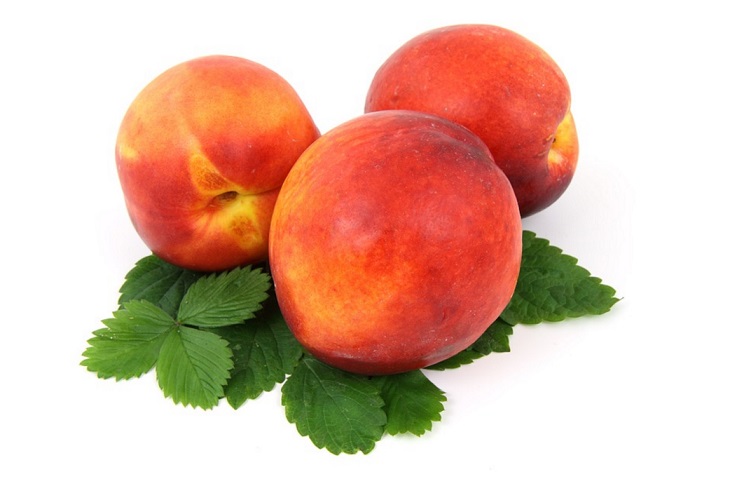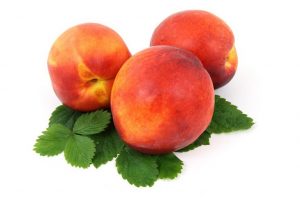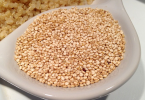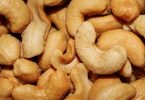Today’s question: can dogs eat peaches? Are peaches good or bad for dogs? Scroll down for detailed answers.
Peaches are one of the sweetest, most delicious fruits out there, and from May to December, finding a fruit that is better tasting and just as sweet is a tough task! It takes a lot to beat the flavor and feeling of a ripe peach in season. Full of vitamins and minerals, peaches are also beneficial to one’s health when consumed in moderation. Peaches can be used as ingredients in homeopathic remedies, as beauty treatments, and in aromatherapy as well. Peaches are incredibly versatile. The fruit is also just as delicious when eaten whole as eaten when blended into other foods. Considering such a delicious fruit, it is natural for dog owners to want to share the succulent, sweet treat with man’s best friend. However, owners must ask, “Can dogs eat peaches, too?”
Originally native to northwest China, peaches have since been adopted and cultivated throughout the world. In the United States, the state of Georgia is known as the “Peach State” for its contribution in the production of some of the world’s finest peaches. Depending upon your geographic location, you may be able to grow a peach tree and enjoy the benefits of the fruit from your own backyard.
Originally from China (where they revered the fruit as a symbol of longevity and immortality), peaches have over the centuries become popular throughout the world, renowned for their tart sweetness and unique texture. The peach was brought to India and Western Asia in ancient times, and introduced into Europe by Alexander the Great. These fruits were well recognized to the Romans, and were indeed a large part of their diet. In the 16th Century, Spanish explorers brought peaches to America, and they made it to England and the rest of Western Europe the next century, where it was regarded as a delicacy.
Know your peaches, roses?
What many people do not realize about peaches is that they are a part of the rose family. The rose family, which also includes the cherry, apricot, almond, and plum, are seen as separate and unique, but derive from the same species. Also, peaches and nectarines, while of the same species, are generally regarded as different fruits. Fruit generally do not look like their flower counterparts, however, when looking into new foods to feed your dog, all aspects of the food need to be considered before offering. If peaches are similar to roses since they are in the same family, there may be a potential side effect of the peach onto your dog’s health.
Peaches bring the nutritional mixed bag
Peaches have a broad range of essential nutrients that are required for the healthy functioning of the body. They are great sources of vitamin A, beta-carotene, and vitamin C, providing required nutrients for healthy skin, eye health, and a strong immune system, among other things. Skin, eye, and immune health are the building blocks for a long life. Often times the dog is overlooked when considering taking care of skin and eyes. Skin needs to be kept in good health due to the potential for rashes and infections. Left untreated or made worse through your dog licking and chewing the affected area, the skin problems can become worse and extend to other areas.
Eye health is also incredibly important. Since a dog cannot tell us when they are having trouble seeing, or have blurry vision, we must do we can as owners to prevent any issues with their sight that are possible. Simple vitamins and nutrients are able to protect their eyes, so offering the vitamins and nutrients as able can help ensure the overall health of your pet.
Peaches also contain high levels of minerals such as potassium, iron, zinc, and calcium. Low in calories, peaches contain no fat or cholesterol and are a great source of dietary fiber. Being low in calories, the peaches can be an alternate treat for your pup without the worry of weight gain. Adding peaches to their kibble, or offered as a standalone treat on occasion is a better option for your dog’s health than offering cookies and candy. The extra fiber the peach offers can also aid in digestion, thereby raising the immune system and preventing infections. Peaches really are a good, sweet treat enjoyed by just about everyone, human and canine.
Can dogs eat peaches?
Considering the peaches’ delicious taste and health benefits, dog owners should be happy to learn that it is completely safe to feed a dog the flesh of the peach. Dogs may even benefit from the vitamin A and fiber content.
The juicy and sweet peach may aid in digestion and bowel movements, potentially improving the dog’s digestive tract and fighting infections. While over-consumption of peaches can lead to mild cases of canine diarrhea, it is only the high amount of sugar that causes this temporary symptom. Introducing peaches to your dog’s diet slowly will help decipher whether peaches will be tolerated. Very little reaction should occur from eating the flesh of a peach, but keep an eye on your dog anyway; just to be sure there is not a first time for everything. When in doubt, or in a bit of trouble, always be sure to refer to your veterinarian for answers to your concerns.
Peaches are rich in vitamins but are also rich in the vital proteins that help in tissue repair and boost immune system strength. This boost of strength from the proteins can be very useful for dogs that play hard and cut themselves frequently. Additionally, peaches can also improve liver and kidney function. Improving the functions of the kidneys and liver allow for more efficient filtration and removal of toxins from a dog’s system. The fewer toxins in the system, the more efficiently the body works. The more efficient the system, the healthier the dog and the longer the life.
The pit problem
While the fruit itself is not harmful, the pit (or seed) in the middle of the peach is the thing to keep an eye out for. Peach pits contain small amounts of cyanide, a chemical that is highly poisonous to both human and dogs.
While the amount of cyanide in a peach pit alone will not pose a major threat to a human, the toxic levels could potentially cause health complications within a dog. Make sure that before serving peaches to a dog, the fruit is cut into pieces and the pit disposed of properly and securely. Be sure to remove the trash from the home that the peach pit is in. Throwing away the pit has good intentions, but if your dog goes into the trash can, the dog will most likely eat the pit.
If you have a peach tree on or near your property, be aware that the trees themselves contain cyanide in their stems and leaves, so avoid letting dogs near it. Fencing the tree is a good idea, but if not applicable to your home, simply keep an eye on your dog to ensure the tree is off limits. In the event your dog eats peaches from the tree while you are not looking, consult your vet and keep a close eye on your dog. Be watchful of choking, intestinal blockage, bloating, odd behaviors, and poisoning.
Be aware of the fact that the peach pit also poses a serious choking hazard, and, as dogs enjoy chewing on foreign objects, it could potentially get stuck and cause a blockage in the dog’s windpipe. Peach pits are generally large compared to other pits and seeds of fruits. A large pit is easily caught within a windpipe. If the pit does manage to make its way down the windpipe, the intestine is easily blocked due to its relative narrow width.
Signs of a swallowed pit
If your dog has in fact swallowed a peach pit by mistake, seek veterinary help immediately. Look out for signs such as excessive drooling, dilated pupils, difficulty in breathing, and dizziness, as these are potential symptoms of swallowing a peach pit. The pit could also get lodged in the dog’s digestive system, leading to intestinal inflammation, or enteritis.
If you live in a place with peach trees growing freely, make sure that peach pits and fallen fruit are not accessible to your dog, especially so if the fallen fruit has had a chance to grow mold. Dogs do not view fruit that has molded as being uneatable as a human may. A dog will eat a peach with mold as easily as a peach that is without mold, so you must be aware of the risks moldy fruit possess when in reach of a dog. Eating moldy fruit can lead to infection, digestive issues, and stomach pain.
Furthermore, be aware that peaches purchased at stores or supermarkets could potentially have been sprayed with toxic pesticides and preservatives. Ensure that these chemicals are gone by thoroughly washing the peach before feeding it to your dog. Using basic fruit soap and water at home can clean the pesticide from the fruit. Essential oils can also be mixed into water in an effort to remove potential toxins naturally and effectively.
Conclusion
Peaches, like all other fruits that dogs enjoy, should be served as a treat in moderation. Keep track of how many peaches you feed your dog; otherwise you might end up with a mess you will have to clean up after!
References:
http://www.akc.org/learn/dog-health/fruits-vegetables-dogs-can-and-cant-eat/
http://www.dogster.com/lifestyle/dog-health-tips-food-can-dogs-eat-peaches
http://www.aspca.org/pet-care/animal-poison-control/toxic-and-non-toxic-plants/peach
http://pets.webmd.com/dogs/ss/slideshow-foods-your-dog-should-never-eat









Leave a Comment